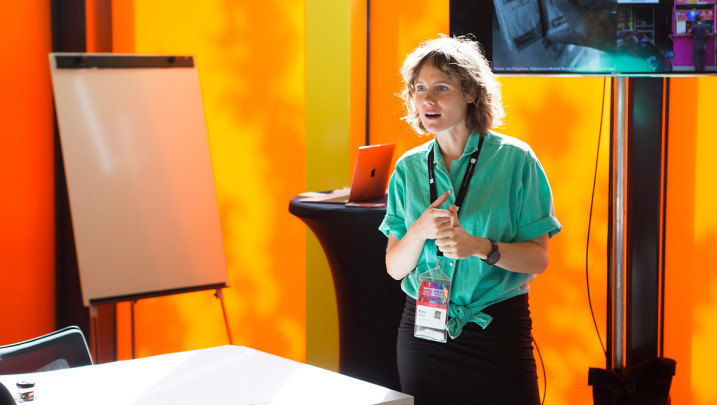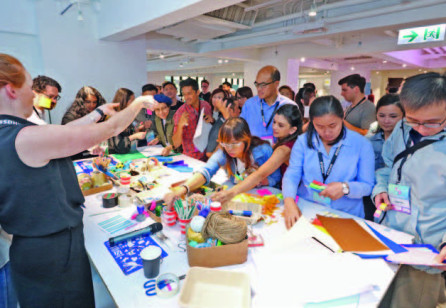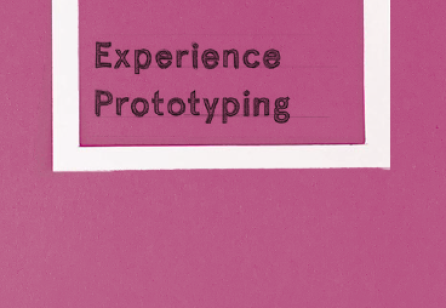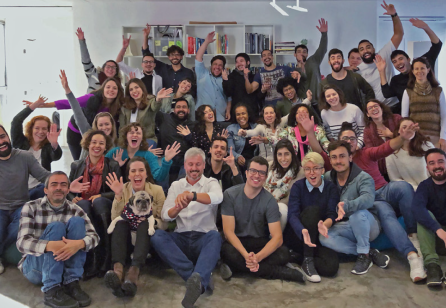What catalysts are helping shape the adoption of service design in the Global South?
"What first comes to my mind is the 'mobile revolution' – within a decade, the share of mobile phone users has grown from less than twenty to almost 100%. Today, the mobile network even in remote locations is much better than at my grandma‘s village in Germany. This has created a crucial touchpoint that allows us to completely rethink how services work.
Many regions lack service providers that companies in the Global North usually rely on (i.e. amazon as shop, DHL for shipping, and paypal for payments) - and this missing system calls for creative approaches, empathy and orchestration—all things service design stands for.
Connected to that is the concept of leapfrogging, or skipping a (seemingly necessary) step during development: People in the Global South went from having no means of long-distance communication directly to using mobile phones, skipping the resource-intensive fixed lines; from having no bank account to using the mobile banking solution M-PESA, and from having no access to energy to running decentralized renewable energy solutions.
And lastly, I see a new generation of well-educated people, be it on the streets of Accra, Ghana; Nairobi, Kenya; or Dhakka, Bangladesh who are dedicated to make a change in their community."
What organizations are at the forefront of successfully delivering service innovation across cultures?
"I would see three different kinds of organizations here. Most visible are agencies collaborating with big funders to carry out research and design projects. IDEO and Frog Design did great projects on e.g. improved cooking or community development in slums.
There are also smaller agencies dedicated to certain topics, like M4ID‘s efforts on maternity health, or the works of Catapult Design, STBY endeva. Important are also facilitating institutions like Acumen Fund or BoP that create attention and bring people together.
And then, you see a growing number of companies, who were founded to really implement new service approaches: Mobisol serving electricity to households and small businesses, Healthy Entrepreneurs building up pharmacists in the village or Hello Tractor catering for smallholder farmers."
Do you know any universities that are fostering the development of service designers in the Global South?
"I think there aren’t enough either in the Global North or the South! Great work is done by LeNSin (the Learning Network on Sustainability), a EU-funded project involving more than 30 universities across the globe and collaborating on research and education in the field.
As a PhD researcher, I am happy to see a growing research community at the nexus of service design and Global South, great studies coming from e.g. Sharon Prendeville from Loughborough University London, Javier Reynoso from Monterrey, Mexico or Raymond Fisk, Laurel Anderson and Amy Ostrom from Arizona State University."
What are the next industries that will be disrupted in the near future in the Global South that service design can help?
"I see a great potential in delivering so-called 'basic services' that we take for granted, be it energy, health, education, communication, transport or governance. While we are here still struggling to find a use case for all these new enablers like internet-of-things, blockchain or drones, they are already helping to make a real change in the Global South."
What are the podcasts/books/blogs that you go to to stay inspired around service design?
"To be honest, I am very much an offline reader, and most often, I get inspired by things that are not labeled service design. I love Thakara’s recent book, “How to thrive in the next economy“ and print magazines such as Die Epilog, Flaneur or Nansen."
Any final thoughts you would like to share on service design in the Global South? (perhaps how it may differ from service design the Global North)
"Let me try to encourage more service designers to join in and work on new ways to serve the underserved— while Sub-Sahara Africa is often portrayed as poor and generally challenging in the media, it really is a green field for innovation and working on seemingly dull topics like waste water management can get truly exciting!"









Share your thoughts
0 RepliesPlease login to comment